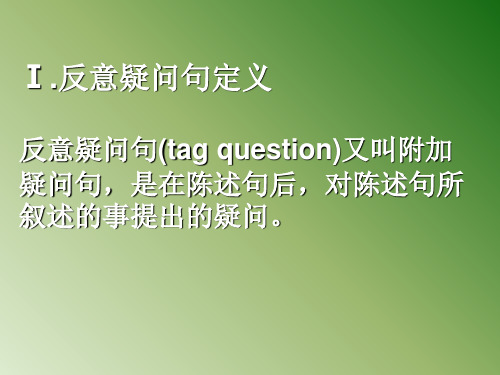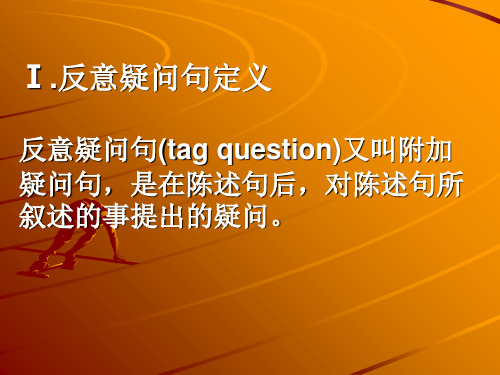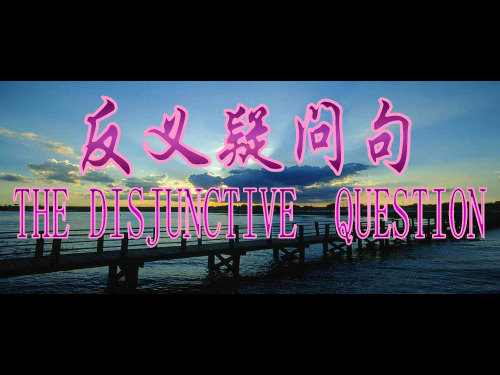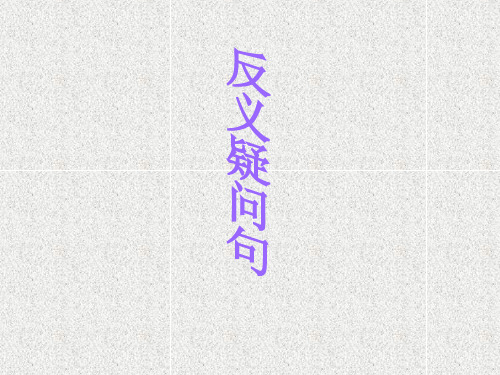反义疑问句课件(初中)
合集下载
中考英语复习课件PPT:反义疑问句详细课件(PPT27张)

[正] Tom can speak Chinese well, can’t he﹖
一般现在时: Lily likes going shopping, doesn’t _______she? are They aren’t students, _______ they? 现在进行时: You’re going to the cinema, _______ aren’t you? is She isn’t waiting for me, _______ she?
2.当陈述部分的主语是everybody, everyone, someone, no one, nobody, somebody等指人的不定代词时,反意 疑问句的附加部分的主语通常用they,但 也可用he。例如: 1)Everybody is here, isn’t he? 2)Nobody wants to go there, don’t they?
5.陈述部分带有 never, few, little, hardly,seldom,nobody,none,no, too…to, nothing等否定意义的词时, 反意疑问句的附加部分的动词用肯 定形式。 例如: Few people know him, do they? She never goes swimming, does she?
Nothing could stop them, could it?
Everything is ready, isn’t it?
6 当陈述部分动词为have(has)时,有以下几种 情况: 1)Have在一般现在时中表示“有”之意,附加 问句的谓语可用have也可用助动词do.
Hale Waihona Puke Eg Tom has a new watch ,hasn’t /doesn’t he?
中考复习--反义疑问句PPT优秀课件

中考复习--反义疑问句PPT优秀课件
中考复习--反义疑问句PPT优秀课件
2.感叹句
其反意疑问句常根据其主、谓语来确定。
• ①How time flies, doesn’t it? • ②How tall the buildings are, aren’t they? • ③How hard it’s raining, isn’t it? • ④What a tall man, isn’t he? • ⑤What tall buildings, aren’t they?
中考复习--反义疑问句PPT优秀课件
中考复习--反义疑问句PPT优秀课件
句型2: 其它形式的祈使句, will you(表示请求) 或won’t you(表示提醒)?
①Come into the classroom, will you? ②Please be careful, will you? ③Be quick, will you? ④Don’t be late again, will you? ⑤Do it at once, will you? ⑥Let me have a try, will you? ⑦Let us leave now, will you?
中考复习--反义疑问句PPT优秀课件
中考复习-反义疑问句PPT优秀课件
四、特殊词类做主语的反意疑问句
2. 指示代词 • ①陈述部分的主语是指示代词this或that时,
反意疑问句的主语用it • This is a plane, isn’t it? 这是一架飞机,是
吗? • ②当陈述部分的主语是指示代词these或
2. The students must study hard, mustn’t they?
中考复习--反义疑问句PPT优秀课件
2.感叹句
其反意疑问句常根据其主、谓语来确定。
• ①How time flies, doesn’t it? • ②How tall the buildings are, aren’t they? • ③How hard it’s raining, isn’t it? • ④What a tall man, isn’t he? • ⑤What tall buildings, aren’t they?
中考复习--反义疑问句PPT优秀课件
中考复习--反义疑问句PPT优秀课件
句型2: 其它形式的祈使句, will you(表示请求) 或won’t you(表示提醒)?
①Come into the classroom, will you? ②Please be careful, will you? ③Be quick, will you? ④Don’t be late again, will you? ⑤Do it at once, will you? ⑥Let me have a try, will you? ⑦Let us leave now, will you?
中考复习--反义疑问句PPT优秀课件
中考复习-反义疑问句PPT优秀课件
四、特殊词类做主语的反意疑问句
2. 指示代词 • ①陈述部分的主语是指示代词this或that时,
反意疑问句的主语用it • This is a plane, isn’t it? 这是一架飞机,是
吗? • ②当陈述部分的主语是指示代词these或
2. The students must study hard, mustn’t they?
反义疑问句详细讲解课件(PPT27张)

I don’t believe he has finished his work.
7.当陈述部分的主句是I think (expect, believe)等结构时,反 意疑问句的附加部分则往往与从 句中的主语和谓语动词保持对应 关系,但要注意否定的转移。 例如:
I think he’s funny, isn’t he? I don’t believe she likes my
You must have seen the film last week, didn’t you?
6. 当陈述部分是I am…时,反意疑 问句部分通常要用aren’t I;如陈述 句部分的主语是I am not时,反意疑 问句部分通常要用am I。 例如:
1)I am a teacher, aren’t I?
Ⅰ.反意疑问句定义
反意疑问句(tag question)又叫附加 疑问句,是在陈述句后,对陈述句所 叙述的事提出的疑问。
Ⅱ.基本结构:
陈述句+逗号+简短的一般疑问句?
遵循前肯定后否定前否后肯式的原则
①前肯后否式。例如:
You are all students, aren’t you﹖
②前否后肯式。例如:
Let’s have a rest, shall we? 以let us开头的祈使句,不包括 说话人在内,因此反意疑问句的 附加部分用will you。例如:
Let us stop now, will you?
Ⅳ. 反意疑问句的回答 “ 根据事实回答”
对反意疑问句的回答,无论问题的提法如何,如果 事实是肯定的,就用yes,事实是否定的,就要用no。 要特别注意陈述句部分是否定结构,反意疑问句部分 用肯定式提问时,回答yes或no与汉语正好相反。这 种省略回答的yes要译成“不”,no要译成“是”。
7.当陈述部分的主句是I think (expect, believe)等结构时,反 意疑问句的附加部分则往往与从 句中的主语和谓语动词保持对应 关系,但要注意否定的转移。 例如:
I think he’s funny, isn’t he? I don’t believe she likes my
You must have seen the film last week, didn’t you?
6. 当陈述部分是I am…时,反意疑 问句部分通常要用aren’t I;如陈述 句部分的主语是I am not时,反意疑 问句部分通常要用am I。 例如:
1)I am a teacher, aren’t I?
Ⅰ.反意疑问句定义
反意疑问句(tag question)又叫附加 疑问句,是在陈述句后,对陈述句所 叙述的事提出的疑问。
Ⅱ.基本结构:
陈述句+逗号+简短的一般疑问句?
遵循前肯定后否定前否后肯式的原则
①前肯后否式。例如:
You are all students, aren’t you﹖
②前否后肯式。例如:
Let’s have a rest, shall we? 以let us开头的祈使句,不包括 说话人在内,因此反意疑问句的 附加部分用will you。例如:
Let us stop now, will you?
Ⅳ. 反意疑问句的回答 “ 根据事实回答”
对反意疑问句的回答,无论问题的提法如何,如果 事实是肯定的,就用yes,事实是否定的,就要用no。 要特别注意陈述句部分是否定结构,反意疑问句部分 用肯定式提问时,回答yes或no与汉语正好相反。这 种省略回答的yes要译成“不”,no要译成“是”。
中考英语-反义疑问句PPT(共46张PPT)

1.反义疑问句 Question Tags
A.目的:我们使用反义疑问句来确认某件事是否是真实的, 或者期望得到对方的肯定回答。
B.构成:陈述部分+附加疑问部分
C.规则: 1.附加疑问部分构成: 由谓语动词的正确形式(be,do ,情态动词)+主格代词 (he,they,it等) 2.时态 陈述部分与附加疑问部分时态保持一致
3) 关于陈述部分的主语和疑问 部分的主语一致问题
陈述部分主语
不定代词everyone,no one, nobody everything,anything,nothing,som ething, this,that one
疑问部 分主语
he/they
it one/he
例句
Everyone is in the classroom, aren't they? Everything goes well, does it? This is your book, isn't it? One can't be always young,can one?
now,_________? 4.It's a nice day,______? 5.Arthur is responsible for the newspaper, ____? 6.Alice has never seen a three-D movie at the cinema,
_______?
动词 + there
There are some apples in the basket, aren't there? There isn't any milk left, is there?
A.目的:我们使用反义疑问句来确认某件事是否是真实的, 或者期望得到对方的肯定回答。
B.构成:陈述部分+附加疑问部分
C.规则: 1.附加疑问部分构成: 由谓语动词的正确形式(be,do ,情态动词)+主格代词 (he,they,it等) 2.时态 陈述部分与附加疑问部分时态保持一致
3) 关于陈述部分的主语和疑问 部分的主语一致问题
陈述部分主语
不定代词everyone,no one, nobody everything,anything,nothing,som ething, this,that one
疑问部 分主语
he/they
it one/he
例句
Everyone is in the classroom, aren't they? Everything goes well, does it? This is your book, isn't it? One can't be always young,can one?
now,_________? 4.It's a nice day,______? 5.Arthur is responsible for the newspaper, ____? 6.Alice has never seen a three-D movie at the cinema,
_______?
动词 + there
There are some apples in the basket, aren't there? There isn't any milk left, is there?
反义疑问句(共14张PPT)全

二、前否+后肯
1.She wasn’t ill last week, was she ? 2.It doesn’t often rain here, does it? 3.Tom won’t go to Shanghai next year,
will he ?
特殊用法1—祈使句的反义疑问句
1、肯定祈使句的反意疑问句,疑问部分用will you或won’t you,否定祈使句则用will you ? 如: Don't do that again, will you? Go with me, will you / won't you?
13、He who seize the right moment, is the right man.谁把握机遇,谁就心想事成。2024/10/172024/10/172024/10/172024/10/1710/17/2024 +14、谁要是自己还没有发展培养和教育好,他就不能发展培养和教育别人。2024年10月17日星期四2024/10/172024/10/172024/10/17 +15、一年之计,莫如树谷;十年之计,莫如树木;终身之计,莫如树人。2024年10月2024/10/172024/10/172024/10/1710/17/2024 +16、教学的目的是培养学生自己学习,自己研究,用自己的头脑来想,用自己的眼睛看,用自己的手来做这种精神。2024/10/172024/10/17October 17, 2024 +17、儿童是中心,教育的措施便围绕他们而组织起来。2024/10/172024/10/172024/10/172024/10/17
一 、前肯+后否 含be动词
1.He is a doctor, isn’t he? 2.I am Chinese, aren’t I?
初中英语反义疑问句ppt 通用优秀PPT课件

They seldom come late, do they? She rarely speaks to you in English, does she?
4)含有ought to 的反意疑问句, 陈述部分是肯定的,疑问部分 用shouldn't / oughtn't +主语。
He ought to know what to do, oughtn't he? / shouldn't he?
Nobody will go, will they?
16)带情态动词dare或need的反 意疑问句,疑问部分常用 need (dare ) +主语。
We need not do it again, need we ? He dare not say so, dare you?
当dare, need 为实义动词时, 疑问部分用助动词 do + 主语。
5)陈述部分有 have to + v. (had to + v.),疑问部分常用don't + 主语(didn't +主语)。
We have to get there at eight tomorrow, don't we?
They had to cross the busy street, didn’t they?
反义疑问句
(The Disjunctive Question)又 叫附加疑问句。它表示提问组成:前一 部分是一个陈述句,后一部分是 一个简短的疑问句,两部分的人 称时态应保持一致。
1.陈述部分肯定式 + 疑问部分 否定式
They work here, don’t they?
4)含有ought to 的反意疑问句, 陈述部分是肯定的,疑问部分 用shouldn't / oughtn't +主语。
He ought to know what to do, oughtn't he? / shouldn't he?
Nobody will go, will they?
16)带情态动词dare或need的反 意疑问句,疑问部分常用 need (dare ) +主语。
We need not do it again, need we ? He dare not say so, dare you?
当dare, need 为实义动词时, 疑问部分用助动词 do + 主语。
5)陈述部分有 have to + v. (had to + v.),疑问部分常用don't + 主语(didn't +主语)。
We have to get there at eight tomorrow, don't we?
They had to cross the busy street, didn’t they?
反义疑问句
(The Disjunctive Question)又 叫附加疑问句。它表示提问组成:前一 部分是一个陈述句,后一部分是 一个简短的疑问句,两部分的人 称时态应保持一致。
1.陈述部分肯定式 + 疑问部分 否定式
They work here, don’t they?
反义疑问句课件

They had to cross the busy street, didn’t they?
特殊用法11
陈述部分的谓语是used to 时,疑问部分用 didn't +主语或 usedn't +主语。
He used to take pictures there, didn't he?
She used to stay up late, usedn’t she?
---祈使句
1. Sit down please, _w__il_l_/_w__o_n_’_t _y_o_u_ ? 2. Please call me, __w_i_ll__/ _w_o_n__’t_y__o_u__? 3. Let’s go home, _s_h_a__ll_w__e________ ? 4. Let us go home, _w__il_l_/_w__o_n_’_t _y_o__u_ ? 5. Don’t leave now, __w_i_ll_y_o__u________?
反义疑问句
(The tag question)又叫附加疑 问句。它表示提问人的看法,没 有把握,需要对方证实。
反意疑问句由“陈述句+简略疑问句”两部分组成,第一部分 提出一种看法,第二部分用来质疑或表示证实。附加疑问句 部分常为:be动词/助动词/情态动词+主语
反意疑问句/ 附加疑问句--规则: 陈述句+附加问句
He would rather read it ten times than recite it, wouldn't he?
特殊用法14
陈述部分有You'd like to + v. 疑问部分用wouldn't +主语。
特殊用法11
陈述部分的谓语是used to 时,疑问部分用 didn't +主语或 usedn't +主语。
He used to take pictures there, didn't he?
She used to stay up late, usedn’t she?
---祈使句
1. Sit down please, _w__il_l_/_w__o_n_’_t _y_o_u_ ? 2. Please call me, __w_i_ll__/ _w_o_n__’t_y__o_u__? 3. Let’s go home, _s_h_a__ll_w__e________ ? 4. Let us go home, _w__il_l_/_w__o_n_’_t _y_o__u_ ? 5. Don’t leave now, __w_i_ll_y_o__u________?
反义疑问句
(The tag question)又叫附加疑 问句。它表示提问人的看法,没 有把握,需要对方证实。
反意疑问句由“陈述句+简略疑问句”两部分组成,第一部分 提出一种看法,第二部分用来质疑或表示证实。附加疑问句 部分常为:be动词/助动词/情态动词+主语
反意疑问句/ 附加疑问句--规则: 陈述句+附加问句
He would rather read it ten times than recite it, wouldn't he?
特殊用法14
陈述部分有You'd like to + v. 疑问部分用wouldn't +主语。
中考英语复习专题反义疑问句课件(共32张PPT)

后
肯
1、简短问句的 主语用人称代词,不用名 词,并要与陈述句的 主语保持一致,同时 前后两部分的助动词、情态动词、动词在 人称、数、时态上要保持一致。
Tom is a good boy , isn’t he ? Tom is a good boy ,isn’t Tom ?
×
×
2、否定疑问句中的not要采用缩写形式
aren’t they They are good at singing , ___________?
Yes, they are.
They sang songs in GZ yesterday, didn’t _________? they No, they didn’t. They come from China, _________? don’t they Yes, they do.
1. 陈述部分的主语是this, that 或v.ing时, 疑问部分的主语多用it;陈述部分的主语是 these, those时,疑问部分的主语多用they。 This is a dictionary,_______ isn’t it? Those are sheep, ________ aren’t they?
It’s cold in the picture,___________? isn’t it Yes,it is.
不论怎样提问,若事实是肯 定的,就用yes回答;若事 实是否定的,就用no回答
do they They don’t like swimming,_________? Yes,they do. 不,他们喜欢
一般情况:肯定句+否定疑问句
前 肯 后 否
否定句+肯定疑问句
前否
后 肯
- 1、下载文档前请自行甄别文档内容的完整性,平台不提供额外的编辑、内容补充、找答案等附加服务。
- 2、"仅部分预览"的文档,不可在线预览部分如存在完整性等问题,可反馈申请退款(可完整预览的文档不适用该条件!)。
- 3、如文档侵犯您的权益,请联系客服反馈,我们会尽快为您处理(人工客服工作时间:9:00-18:30)。
___i_s__ _t_h_e_r_e__ ? 9. There weren’t many cars in the street,
_w__e_r_e__ _t_h_e_r_e__ ? 10. Don’t smoke, ____w_i_ll_ __y_o_u_ ? 11. Let’s do it, __s_h_a_l_l_ _w_e___ ?
特殊用法1 ---祈使句的反意疑问句:
在祈使句后面附加问句,以加强语气或使祈使 句听起来较委婉、客气。附加问句可选用 “will you? ”“won’t you?”。
祈使句为否定结构时,附加问句一般只用 “will you?”.
陈述句为 “Let’s…” 结构时, 表示建议,其意思 包括对方,即“让我们(你我双方)”附加问句一 般用 “shall we?” 。
you last night, ___w_e_r_e_n_’_t_ _y_o_u__ ? 5. She is going to visit me, _s_n_’_t _s_h_e_? 6. I am Chinese, _a_r_e_n_’t_ __I____?
行为动词:
1. It often rains here, _d__o_e_s_n_’_t _i_t _ ? 2. He likes soccer, __d_o__e_s_n_’_t _h__e_ ? 3. You have a headache, _d__o_n_’_t _ y__o_u? 4. I called you yesterday, _d_i_d_n_’_t_ _I_?
其它动词:
1. You will go to America, _w_o__n_’t_ _y_o_u? 2. We have ever been to Shanghai,
__h_a_v_e_n__’t_ __w_e___ ?
2. 前否,+ 后肯
1. You aren’t an actor, ___a_r_e_ _y_o_u_ ? 2. He isn’t a good boy, ____i_s_ _h__e__ ? 3. It wasn’t fine yesterday, _w_a_s_ __i_t_ ? 4. It doesn’t rain here, __d_o_e_s_ __i_t _ ? 5. His sister doesn’t have a headache,
___d_o_e_s__ _s_h_e__ ? 6. You didn’t call me yesterday,
__d_i_d___ _y_o_u__?
7. You won’t go to U.S.A., __w_i_ll__ _y_o_u_?
8. There isn’t a boy in our classroom,
陈述句为 “Let us…” 结构时, 表示请求,其意 思不包括对方,即“你让我们…(You let us)”,附 加问句一般用 “will you?”
---祈使句
1. Sit down please, _w__il_l_/_w__o_n_’_t _y_o_u_ ? 2. Please call me, __w_i_ll__/ _w_o_n__’t_y__o_u__? 3. Let’s go home, _s_h_a__ll_w__e________ ? 4. Let us go home, _w__il_l_/_w__o_n_’_t _y_o__u_ ? 5. Don’t leave now, __w_i_ll_y_o__u________?
It rained heavily yesterday, _d_id_n_’t_it__?
Yes, it did.
Liu Xiang won the hurdle race again, _d_id_n_’t_h_e_?
Yes, he did.
There was a heavy snow last year, _w_a_s_n_’t _th_e_re_?
Jay sings many songs, doesn’t he ? Yes, he does.
Lily was ill in bed, _w_a_s_n_’t_s_he__?
Yes, she was.
She wasn’t at home, _w_as__sh_e__?
No, she wasn’t.
Unit 10 It's a nice day, isn't it?
tag questions
It’s cold ,___is_n_’_t _it____? Yes,it is.
They are playing football, aren’t they?
Yes, they are.
They don’t like swimming,__d_o_t_h_e_y__? No, they don’t. They enjoy it a lot.
Yes, there was.
反意疑问句/ 附加疑问句--规则: 陈述句+附加问句
1. 前肯,后否; 2. 前否,后肯;
3. 附加问句和陈述句人称、时态一 致(相应时态的助动词的肯定/ 否定形式+人称代词)。
1. 前肯,+ 后否
be 动词:
1. You are an actor, __a_r_e_n__’t_ __y_o_u_ ? 2. He is a good boy, ___i_s_n_’t__ ___h_e__ ? 3. It was fine yesterday, _w_a__s_n_’t_ _i_t_ ? 4. You were studying when I called
The students were in the classroom,w_e_re_n_’t_t_he_y_?
Yes, they were.
They weren’t in the zoo last Sunday, _w_e_r_e_th_e_y?
No, they weren’t. They went to the mountains.
_w__e_r_e__ _t_h_e_r_e__ ? 10. Don’t smoke, ____w_i_ll_ __y_o_u_ ? 11. Let’s do it, __s_h_a_l_l_ _w_e___ ?
特殊用法1 ---祈使句的反意疑问句:
在祈使句后面附加问句,以加强语气或使祈使 句听起来较委婉、客气。附加问句可选用 “will you? ”“won’t you?”。
祈使句为否定结构时,附加问句一般只用 “will you?”.
陈述句为 “Let’s…” 结构时, 表示建议,其意思 包括对方,即“让我们(你我双方)”附加问句一 般用 “shall we?” 。
you last night, ___w_e_r_e_n_’_t_ _y_o_u__ ? 5. She is going to visit me, _s_n_’_t _s_h_e_? 6. I am Chinese, _a_r_e_n_’t_ __I____?
行为动词:
1. It often rains here, _d__o_e_s_n_’_t _i_t _ ? 2. He likes soccer, __d_o__e_s_n_’_t _h__e_ ? 3. You have a headache, _d__o_n_’_t _ y__o_u? 4. I called you yesterday, _d_i_d_n_’_t_ _I_?
其它动词:
1. You will go to America, _w_o__n_’t_ _y_o_u? 2. We have ever been to Shanghai,
__h_a_v_e_n__’t_ __w_e___ ?
2. 前否,+ 后肯
1. You aren’t an actor, ___a_r_e_ _y_o_u_ ? 2. He isn’t a good boy, ____i_s_ _h__e__ ? 3. It wasn’t fine yesterday, _w_a_s_ __i_t_ ? 4. It doesn’t rain here, __d_o_e_s_ __i_t _ ? 5. His sister doesn’t have a headache,
___d_o_e_s__ _s_h_e__ ? 6. You didn’t call me yesterday,
__d_i_d___ _y_o_u__?
7. You won’t go to U.S.A., __w_i_ll__ _y_o_u_?
8. There isn’t a boy in our classroom,
陈述句为 “Let us…” 结构时, 表示请求,其意 思不包括对方,即“你让我们…(You let us)”,附 加问句一般用 “will you?”
---祈使句
1. Sit down please, _w__il_l_/_w__o_n_’_t _y_o_u_ ? 2. Please call me, __w_i_ll__/ _w_o_n__’t_y__o_u__? 3. Let’s go home, _s_h_a__ll_w__e________ ? 4. Let us go home, _w__il_l_/_w__o_n_’_t _y_o__u_ ? 5. Don’t leave now, __w_i_ll_y_o__u________?
It rained heavily yesterday, _d_id_n_’t_it__?
Yes, it did.
Liu Xiang won the hurdle race again, _d_id_n_’t_h_e_?
Yes, he did.
There was a heavy snow last year, _w_a_s_n_’t _th_e_re_?
Jay sings many songs, doesn’t he ? Yes, he does.
Lily was ill in bed, _w_a_s_n_’t_s_he__?
Yes, she was.
She wasn’t at home, _w_as__sh_e__?
No, she wasn’t.
Unit 10 It's a nice day, isn't it?
tag questions
It’s cold ,___is_n_’_t _it____? Yes,it is.
They are playing football, aren’t they?
Yes, they are.
They don’t like swimming,__d_o_t_h_e_y__? No, they don’t. They enjoy it a lot.
Yes, there was.
反意疑问句/ 附加疑问句--规则: 陈述句+附加问句
1. 前肯,后否; 2. 前否,后肯;
3. 附加问句和陈述句人称、时态一 致(相应时态的助动词的肯定/ 否定形式+人称代词)。
1. 前肯,+ 后否
be 动词:
1. You are an actor, __a_r_e_n__’t_ __y_o_u_ ? 2. He is a good boy, ___i_s_n_’t__ ___h_e__ ? 3. It was fine yesterday, _w_a__s_n_’t_ _i_t_ ? 4. You were studying when I called
The students were in the classroom,w_e_re_n_’t_t_he_y_?
Yes, they were.
They weren’t in the zoo last Sunday, _w_e_r_e_th_e_y?
No, they weren’t. They went to the mountains.
